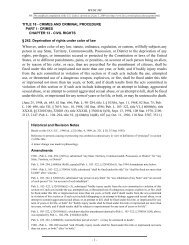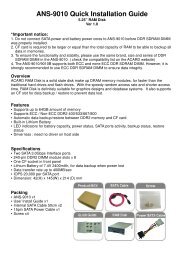INDIVIDUAL PRACTICES OF JUDGE LOUIS L. STANTON Unless ...
INDIVIDUAL PRACTICES OF JUDGE LOUIS L. STANTON Unless ...
INDIVIDUAL PRACTICES OF JUDGE LOUIS L. STANTON Unless ...
You also want an ePaper? Increase the reach of your titles
YUMPU automatically turns print PDFs into web optimized ePapers that Google loves.
c. Stand a respectful distance from the jury at alltimes.d. In your opening statement to the jury, do notargue the case and do not discuss law. Confineyourself to a concise summary of the important facts.Do not describe in detail what particular witnesseswill say. <strong>Unless</strong> the case is unusually complex, eachparty will be limited to 10 minutes.e. Please stand when you question witnesses.(Counsel with physical disabilities will be excusedfrom this requirement). Do not pace about thecourtroom when questioning witnesses. This distractsthe jury and wastes time.f. If you intend to question a witness about a groupof documents, avoid delay by having all the documentswith you when you start the examination.g. When you object, make your objection short and tothe point. Do not argue the objection in the presenceof the jury, and do not argue with the ruling of thecourt in the presence of the jury. Do not make motions(e.g., a motion for a mistrial) in the presence of thejury. Such matters may be raised at the first recess.h. Do not face or otherwise appear to addressyourself to jurors when questioning a witness.i. The jury should hear the instructions on the lawof the case from the court, an impartial source. Inyour final argument, you may tell the jury what youbelieve the substance of the court's instruction on aparticular subject will be, but do not read or quoteany instruction.<strong>LOUIS</strong> L. <strong>STANTON</strong>UNITED STATES DISTRICT <strong>JUDGE</strong>6













